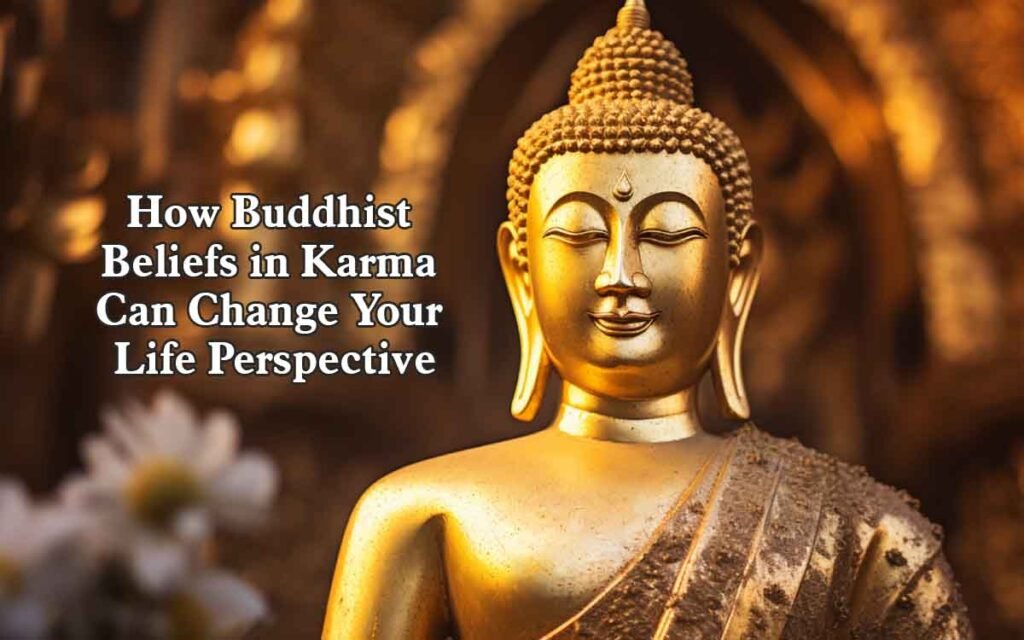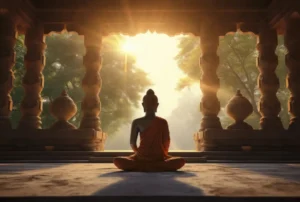Table of Contents
ToggleModern life has a significant impact on an individual’s spiritual perspective. Now people are depending upon ancient philosophies to find answers that modern life can’t give. People are curious about why some things are happening the way it is. The concept that raised a thousand questions is Karma.
People used to say that “What goes around comes around.” The Buddhist belief in karma is a powerful idea. If you have a clear-cut idea about Karma, then it will deeply impact the way you see yourself, others and the things that are happening around you. This blog will help you understand the meaning of karma in life. Let’s go through it.
Understanding Karma in Buddhist Philosophy
Now, let’s look at what is karma in Buddhist philosophy?
In simple words, Karma stands for action. It is not fate, a punishment or a cosmic revenge. It is just an action. If we go for specifics, then it is an intentional action.
Now we can look at what is the meaning of karma in life. As an individual, every second you think, speak or do any action with a particular intent in your life, you are generating karma. This karma spreads over time and shapes your life experience, your mentality and your way of life.
At the same time, there are some other belief systems that believe that karma is more like a cause-and-effect-centred phenomenon. Simply saying that when you do good to others, you will get good. Buddhist beliefs in karma focus on cause and effect over time. In reality, karma is less focused on reward or punishment and more about natural outcomes. If you plant an orange seed, you don’t get an apple. In the same way, if you are angry at someone, you will receive more anger in return. One thing you need to keep in mind is that it will not happen immediately, but it can happen at any time.
Karma will not happen in the way we expect , it will happen quietly. It is not immediate; but it will play out in unexpected ways. It is the vagueness of human life.
Karma and Reincarnation in Buddhism
Now, here’s where things get layered. In Buddhism, karma doesn’t just play out in this lifetime. It follows us across lifetimes.
Buddhist beliefs in karma have a deeper connection with reincarnation. According to the Buddhist concept, you live, act and die. Then you will be reborn based on your karma. This circle in Buddhist philosophy is known as samsara– it goes in an endless rhythm of birth, suffering, death, and rebirth.
According to the karma and reincarnation in Buddhism, your current life circumstances might be tied to the actions of your past lives.
How Karma Shapes Your Life Perspective
Let’s look at Buddhist beliefs in karma according to the cause and effect approach. It is based on intention and it urges one to reflect. Why am I responding this way? What kind of consequence will this action have?
You don’t need to obsess about every move of yours. The only thing you have to do is become a little aware of your actions.
So, in the bigger picture, what is the meaning of karma in life?
Instead of obsessing over why bad things happen to good people, you must start to think about what is the lesson I could learn from this event. Or what is awaiting for me on tomorrow.
It’s not that easy to reach that stage, but with resilienc,e you can earn it. It builds compassion for yourself as well as for others. Karma always undergoes changes so we must go with that.
Can Karma Affect Your Health and Wealth?
Now let’s tackle a tricky question: Can karma influence your health and wealth?
According to some traditions the answer is yes. The current life situation of yours which includes your body, your bank balance, can carry traces from past karma.
Buddhist beliefs in karma don’t encourage superstition. It’s not about blaming people for their suffering or assuming the rich are more virtuous. That’s a dangerous way. Rather, it encourages ethical living, which includes compassion, generosity, and mindfulness. If you lead a life with those values then it will create better outcomes, both inwardly and outwardly.
In a nutshell, karma can affect your health and wealth. Not in a simplistic “good = rich” kind of way, more of a subtle way.
Daily Practices to Align with Positive Karma
You don’t need to be a monk to live by Buddhist beliefs in karma. There are some mindful practices you can follow.
Meditation and mindfulness are ones you can do. It comes with simple steps, such as sitting quietly for a few minutes. It helps you to concentrate on your thoughts before they become actions.
By following the Noble Eightfold Path, you can speak with kindness and act ethically.
Leading a compassionate life is another way.
So now you have a clear picture of what is the meaning of karma in life is.
Always think about whether this action results in peace in the future.
Conclusion
In conclusion, karma in Buddhist philosophy isn’t about controlling; instead, it is more about understanding.
By embracing Buddhist beliefs in karma, we start to live a little differently. A little slower, maybe. A little kinder. We reflect more and try to react less. We realize that the present moment is always an opportunity to break a pattern, to plant a better seed.
You don’t need to convert or change your whole identity to appreciate these ideas. Just begin with small steps, a deeper breath, kinder words and more conscious choices.
For more such thoughtful insights, you can visit our page Hiddenmantra.









